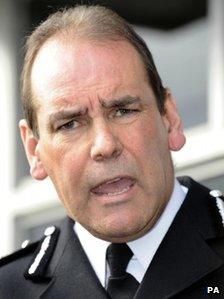Hillsborough disaster: IPCC report on Bettison allegations
- Published

Sir Norman is the subject of two IPCC investigations
A police watchdog has said a former chief constable could have been sacked for his actions following the publication of a damning report into the Hillsborough disaster.
Sir Norman Bettison would have a "case to answer for gross misconduct" if he was a serving officer, the IPCC found.
It concluded he tried to influence public perception as West Yorkshire Police Authority was deciding whether to refer him to the IPCC.
His solicitor criticised the findings.
'Dismissal justified'
The Independent Police Complaint Commission's report concluded that Sir Norman, who resigned last year, had a case to answer for discreditable conduct and abuse of authority.
Deborah Glass, deputy chair of the IPCC, said: "It was the IPCC's view at the start of the investigation, as it was the view of his Police Authority, that Sir Norman's actions, if proven, fell so far short of what is expected of a chief constable that dismissal would be justified.
"The evidence uncovered during the investigation supports that view.
"While we cannot bring this case to misconduct proceedings, we can publish the evidence and our conclusions, so that the public can judge for themselves."
Sir Norman's solicitor, John Harding, said the way in which the investigation had been handled "called into question the fairness of such a process."
He said: "The decision that there is a case to answer is not a finding of guilt. This point is accepted, explicitly, in the foreword of the IPCC report and it therefore sits, uncomfortably, with some of the comments in the investigator's report, made after an incomplete investigation.
"Sir Norman voluntarily attended interview, provided a written statement and invited the IPCC to interview witnesses. Since there can be no formal misconduct hearing my client is denied the opportunity to call those witnesses, which the IPCC declined to interview, and is denied the opportunity to put his case and challenge other evidence."
'Own self-interest'
Margaret Aspinall, of the Hillsborough Family Support Group, said Sir Norman should be stripped of his knighthood.
She said: "In the IPCC's own words, this was gross misconduct and, in my mind, that is a very serious offence and the fact that he resigned should not mean that this report is the end of it.
"We want to see him stripped of his honours - his knighthood and his Honorary Fellowship from Liverpool John Moores University."
Deborah Glass, deputy chair of the IPCC, told the BBC that by publishing the report the public could "judge for themselves"
Mrs Aspinall, whose 18-year-old son James died at Hillsborough, added: "I believe he resigned to protect his pension and his behaviour has shown he is not deserving of that pension."
The investigation related to the period following the publication of the Hillsborough Independent Panel report, which laid bare police attempts to shift the blame for the tragedy to the victims.
While serving with the South Yorkshire force, Sir Norman was a key figure in compiling its report into how it handled the aftermath of the tragedy.
A separate IPCC investigation into his conduct at that time is ongoing but Sir Norman has always denied being involved in any cover-up.
Last autumn, following his resignation as chief constable, the West Yorkshire Police Authority asked the IPCC to investigate whether he had tried to interfere with its inquiries into his role at Hillsborough.
The IPCC report concluded while he had not tried to prevent the referral from happening he had "attempted to manipulate the public perception of the referral process for his own self-interest."
When he resigned last October Sir Norman said he would co-operate fully with the IPCC investigations.
- Published28 March 2013
- Published24 October 2012
- Published24 October 2012
- Published24 October 2012